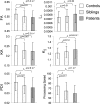Diffusion-weighted imaging uncovers likely sources of processing-speed deficits in schizophrenia
- PMID: 27834215
- PMCID: PMC5127361
- DOI: 10.1073/pnas.1608246113
Diffusion-weighted imaging uncovers likely sources of processing-speed deficits in schizophrenia
Abstract
Schizophrenia, a devastating psychiatric illness with onset in the late teens to early 20s, is thought to involve disrupted brain connectivity. Functional and structural disconnections of cortical networks may underlie various cognitive deficits, including a substantial reduction in the speed of information processing in schizophrenia patients compared with controls. Myelinated white matter supports the speed of electrical signal transmission in the brain. To examine possible neuroanatomical sources of cognitive deficits, we used a comprehensive diffusion-weighted imaging (DWI) protocol and characterized the white matter diffusion signals using diffusion kurtosis imaging (DKI) and permeability-diffusivity imaging (PDI) in patients (n = 74), their nonill siblings (n = 41), and healthy controls (n = 113). Diffusion parameters that showed significant patient-control differences also explained the patient-control differences in processing speed. This association was also found for the nonill siblings of the patients. The association was specific to processing-speed abnormality but not specific to working memory abnormality or psychiatric symptoms. Our findings show that advanced diffusion MRI in white matter may capture microstructural connectivity patterns and mechanisms that govern the association between a core neurocognitive measure-processing speed-and neurobiological deficits in schizophrenia that are detectable with in vivo brain scans. These non-Gaussian diffusion white matter metrics are promising surrogate imaging markers for modeling cognitive deficits and perhaps, guiding treatment development in schizophrenia.
Keywords: cognitive deficits; diffusion-weighted imaging; endophenotypes; processing speed; schizophrenia.
Conflict of interest statement
L.E.H. has received or planned to receive research funding and/or consulting fees from Mitsubishi, Your Energy Systems LLC, Neuralstem, Pfizer, Sound Pharma, and Taisho. The other authors declare no conflicts of interest.
Figures




References
-
- Kahn RS, Keefe RS. Schizophrenia is a cognitive illness: Time for a change in focus. JAMA Psychiatry. 2013;70(10):1107–1112. - PubMed
-
- Friston KJ, Frith CD. Schizophrenia: A disconnection syndrome? Clin Neurosci. 1995;3(2):89–97. - PubMed
-
- Dickinson D, Ramsey ME, Gold JM. Overlooking the obvious: A meta-analytic comparison of digit symbol coding tasks and other cognitive measures in schizophrenia. Arch Gen Psychiatry. 2007;64(5):532–542. - PubMed
-
- Knowles EE, David AS, Reichenberg A. Processing speed deficits in schizophrenia: Reexamining the evidence. Am J Psychiatry. 2010;167(7):828–835. - PubMed
Publication types
MeSH terms
Grants and funding
LinkOut - more resources
Full Text Sources
Other Literature Sources
Medical

